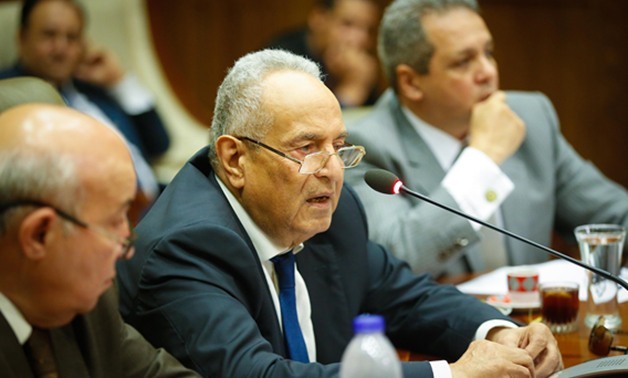
Bahaa el-Din Abu Shoka – file photo
CAIRO – 1 May 2018: A few days after Parliament’s majority Egypt Support coalition announced seeking to merge all the parties comprising the coalition into one unified party in order to “politically support the state”, Wafd Party is seeking to form an opposition coalition inside the Parliament.
Sources revealed that Wafd Party Chairman Bahaa el-Din Abu Shoka is discussing a suggestion to form an opposition coalition with a number of Parliament members. If formed, the coalition will be a sole rival to the pro-government Egypt Support coalition.
The Egypt Support coalition holds around 400 of 597 seats in Parliament (about two-thirds the number of MPs) and is comprised of different parties, including the Free Egyptians, Future of a Nation, Homeland Defenders, Republican Peoples and Conference parties, in addition to many independent members.
Suleiman Wahdan, a senior Wafd MP and deputy speaker of parliament, said that the Egyptian people enjoy a level of freedom and that a big space for opposition should consequently be provided. He added that such a role should be played by the Wafd and the rest of the political parties.
The Wafd bloc in Parliament will have a strong influence on the political scene, Wahdan said, adding that if the Wafd manages to form a strong coalition, Egyptians will react positively to the accomplishment, and a good image of Parliament will be projected.
Amr Moussa, head of the advisory board
Wafd Party Treasurer Mohamed Al-Husseini said that Wafd declared former Arab League Secretary-General Amr Moussa as the head the newly established advisory board of the party.
In the board’s first meeting on Monday evening, Amr Moussa, who is honorary president of the party, thanked Abu Shoka, saying that the meeting has established a work schedule and that all the board members will attend the next meeting.
“Everyone will stand by the [Wafd] party and its leadership,” Moussa said, explaining that the upcoming local election will make the board start working sooner rather than later.
Local elections are supposed to be carried out in the first half of next year, which will be the first in a decade. Egypt has been without local councils since June 2011, when a court dissolved them after the popular uprising that ended the 30-year rule of former President Hosni Mubarak.
Amr Moussa was seen while casting his vote in the 2018 presidential election on the first day of the vote on March 26. Incumbent President Abdel Fatah al-Sisi faced no real challenge, beating his sole contender, Moussa Moustafa Moussa, head of the Ghad Party. The former garnered 97.08 percent of valid votes in the election, according to the National Election Authority.
 Amr Moussa, former Secretary-General of the Arab League, on the first voting day in the 2018 Presidential Election- Press Photo
Support Egypt’s ambitions possible?
Amr Moussa, former Secretary-General of the Arab League, on the first voting day in the 2018 Presidential Election- Press Photo
Support Egypt’s ambitions possible?
On April 22, a number of members of the Support Egypt coalition and Parliament Speaker Ali Abdel Aal discussed the possibility of merging all political parties that comprise the coalition into a unified party.
In an interview with Egypt Today, MP Ali Abdel Wanis, a member of the coalition, said that the idea aims to emulate parliaments around the world by forming a party that acts as a political backer of the state.
Abdel Wanis added that merging parties will help prevent contradictory opinions in case a certain party and the coalition hold different views.
However, it is likely that the pro-government parliamentary coalition will face a legal challenge. Abdel Wanis told Egypt Today that an amendment is required in order for the merge to take place.
Article 110 of the Constitution stipulates that members of Parliament may be stripped of their legislative seat if they lose the conditions for membership on the basis of which they were elected.
According to law, independent parliamentarians are not permitted to become party members during their term in office, or vice versa. In addition, party members cannot change their parties mid-term, said Constitutional Law Professor Fathi Fekri to Masrawy, adding that MPs have to preserve the conditions for which they gained people’s trust.
A number of political parties of the coalition, which is comprised of about 10 political parties as well as independent parliamentarians, opposed merging parties into a unified political party, considering it illegal or diminishing the identity of a party.
Hazem Omar, chairman of the Republican Peoples' Party, said that his party will not object to the coalition if it announces a political party, but will not be part of it, adding that he will choose to retain his party’s identity.

Comments
Leave a Comment